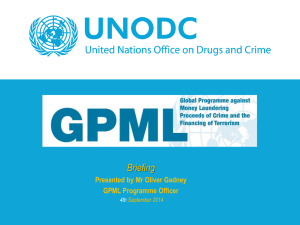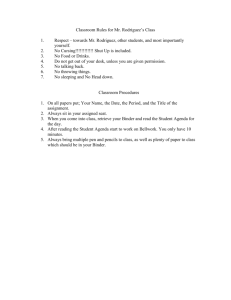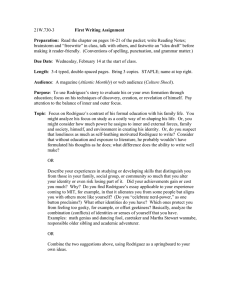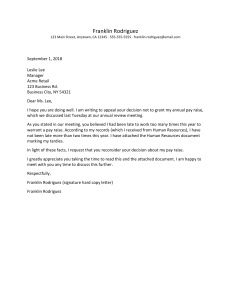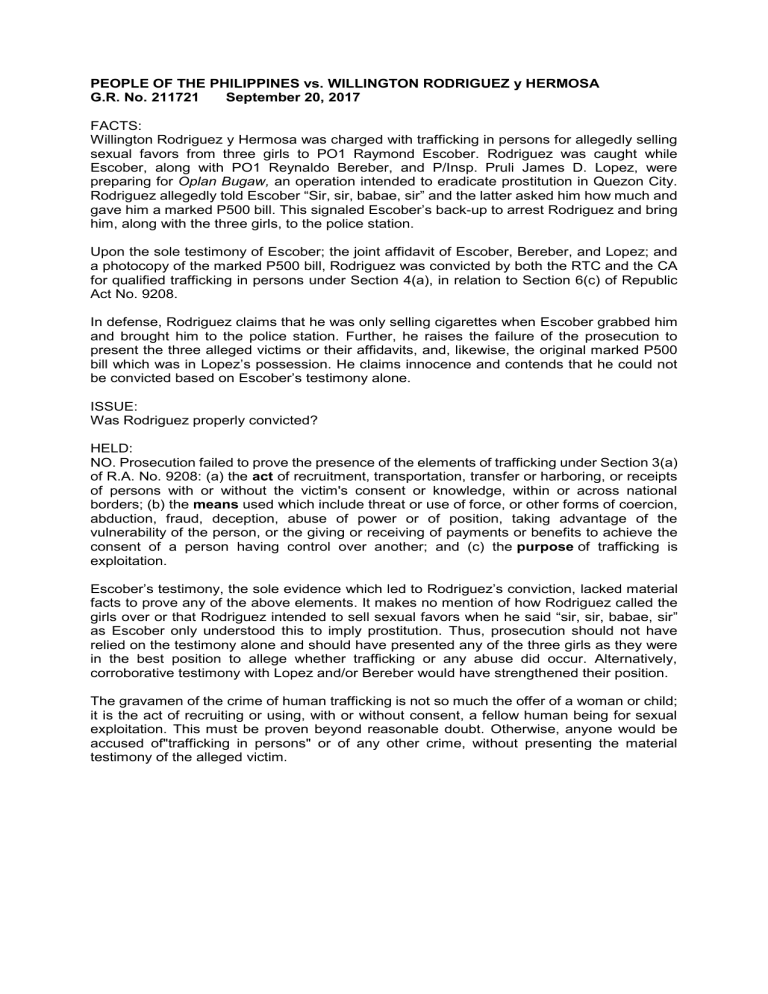
PEOPLE OF THE PHILIPPINES vs. WILLINGTON RODRIGUEZ y HERMOSA G.R. No. 211721 September 20, 2017 FACTS: Willington Rodriguez y Hermosa was charged with trafficking in persons for allegedly selling sexual favors from three girls to PO1 Raymond Escober. Rodriguez was caught while Escober, along with PO1 Reynaldo Bereber, and P/Insp. Pruli James D. Lopez, were preparing for Oplan Bugaw, an operation intended to eradicate prostitution in Quezon City. Rodriguez allegedly told Escober “Sir, sir, babae, sir” and the latter asked him how much and gave him a marked P500 bill. This signaled Escober’s back-up to arrest Rodriguez and bring him, along with the three girls, to the police station. Upon the sole testimony of Escober; the joint affidavit of Escober, Bereber, and Lopez; and a photocopy of the marked P500 bill, Rodriguez was convicted by both the RTC and the CA for qualified trafficking in persons under Section 4(a), in relation to Section 6(c) of Republic Act No. 9208. In defense, Rodriguez claims that he was only selling cigarettes when Escober grabbed him and brought him to the police station. Further, he raises the failure of the prosecution to present the three alleged victims or their affidavits, and, likewise, the original marked P500 bill which was in Lopez’s possession. He claims innocence and contends that he could not be convicted based on Escober’s testimony alone. ISSUE: Was Rodriguez properly convicted? HELD: NO. Prosecution failed to prove the presence of the elements of trafficking under Section 3(a) of R.A. No. 9208: (a) the act of recruitment, transportation, transfer or harboring, or receipts of persons with or without the victim's consent or knowledge, within or across national borders; (b) the means used which include threat or use of force, or other forms of coercion, abduction, fraud, deception, abuse of power or of position, taking advantage of the vulnerability of the person, or the giving or receiving of payments or benefits to achieve the consent of a person having control over another; and (c) the purpose of trafficking is exploitation. Escober’s testimony, the sole evidence which led to Rodriguez’s conviction, lacked material facts to prove any of the above elements. It makes no mention of how Rodriguez called the girls over or that Rodriguez intended to sell sexual favors when he said “sir, sir, babae, sir” as Escober only understood this to imply prostitution. Thus, prosecution should not have relied on the testimony alone and should have presented any of the three girls as they were in the best position to allege whether trafficking or any abuse did occur. Alternatively, corroborative testimony with Lopez and/or Bereber would have strengthened their position. The gravamen of the crime of human trafficking is not so much the offer of a woman or child; it is the act of recruiting or using, with or without consent, a fellow human being for sexual exploitation. This must be proven beyond reasonable doubt. Otherwise, anyone would be accused of"trafficking in persons" or of any other crime, without presenting the material testimony of the alleged victim.
